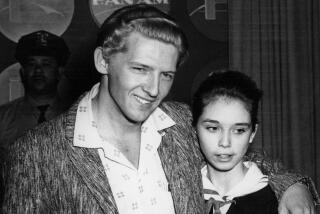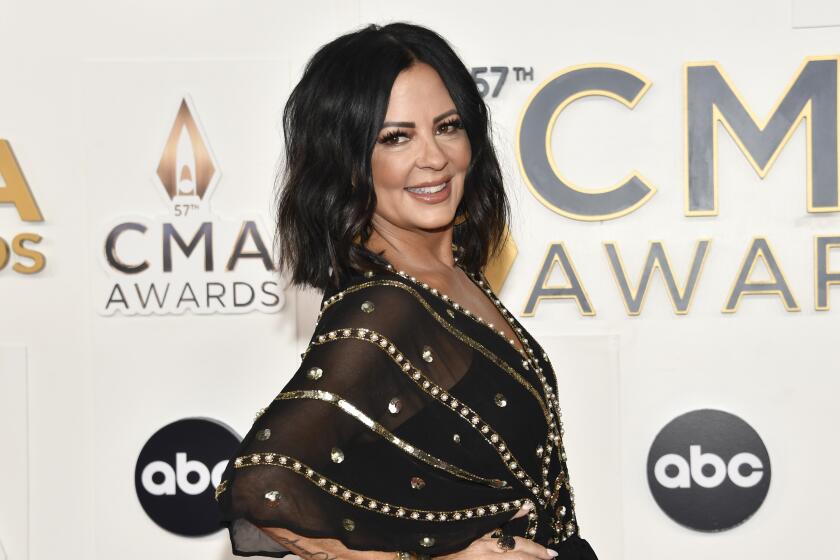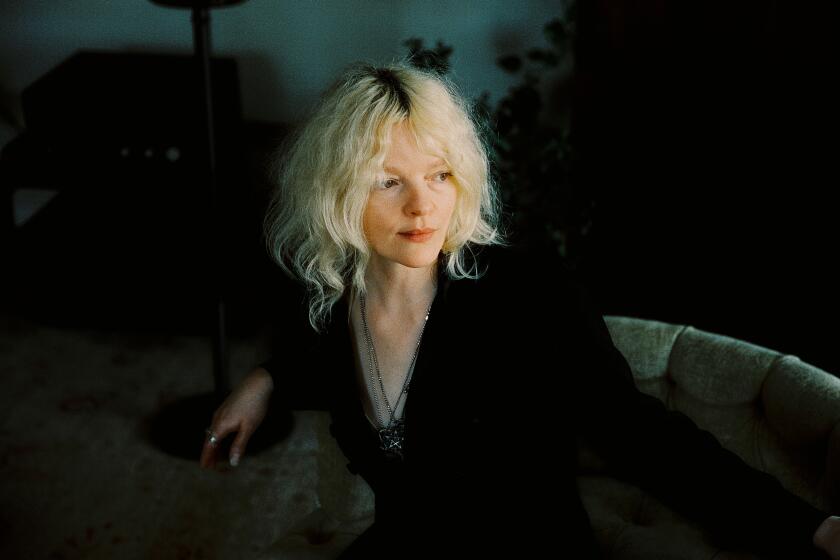JAZZ REVIEW : Yule Concert Easily Passes Test of Time
A number of times during his annual All Star Christmas Concert at the Coach House Friday night, fluegelhornist-composer Tony Guerrero joked about the length of last year’s show.
“Last year,” he panned, “people were asking me, ‘Who you gonna have play with you in your show?’ This year they’re asking me, ‘Tony, how long is this show going to be ?’ ”
The answer: longer than last year’s slightly-less-than-three-hour affair, putting it on the plus side of three hours. But it seemed shorter. With 20 musicians combining in a variety of situations from duos to a rockin’ 17-piece fusion ensemble, there was little time for clock-watching. What was going down on stage was, for the most part, too enjoyable.
A lot of that enjoyment was provided by Guerrero himself. His playing continues to mature, and his already melodic approach continues to sweeten. His tone on fluegelhorn was as warm and fluffy as a feather pillow during ballads, more direct and pointed during up-tempo numbers. Though his range is narrow, his ability as a storyteller inside that range often was impressive, as one line moved surely into another.
Guerrero used his trumpet to pay homage to Miles Davis and Louis Armstrong. During his own “Groove Tune,” he used the mute for an eerie recreation of Davis’ soft, smeared tone, even crouching like Miles at times and leaving a long, dramatic pause at one point that recalled Davis to a tee.
Using only his hand, he created New Orleans-y wah-wah effects before singing Irving Berlin’s “White Christmas” in Armstrong’s gravelly tone, complete with Satchmo-like phrasing and lyric variations.
Also on display were Guerrero’s skills as a composer and arranger, areas where the 26-year-old shows the most promise. When an 11-piece band swirled through a suspended-tempo rendition of the melancholy “O Come, O Come Emmanuel,” the depth of sound was almost chilling. The swelling wall of sound gave way to Guerrero’s “The Passion,” a light propulsive number decorated with smart additions from the four-piece horn section.
The arrangements for 12-piece ensemble gave added, luxurious weight to Guerrero’s rhythmically and melodically accessible tunes. So impressive was the sound that Guerrero perhaps should consider writing and recording for this large, electric format (he could call it the Tony Guerrero Fusion Big Band).
A big part of the thick, lush sound came from keyboardist Freddie Ravel (replacing regular Guerrero keyboardist Bill Cantos, who is touring with Diane Schuur). Ravel showed an ability to pick just the right sounds from his synthesizers and to insert them in just the right places.
When soloing, Ravel added improvisational excitement with a wind-controller, a mouth-held device that allows him to modify the dynamics of his tones with his own breath. He used it to warble and cry during “Groove Tune,” blowing with all the drama and movement of an R&B; saxman.
Guerrero brought alto saxophonist Everette Harp out to play along on the ballad “First Love,” to which Harp contributed strong, David Sanborn-esque tones with more dynamic variation than Sanborn usually gives. Harp was at his best on up-tempo numbers, working with especially intense fire during Guerrero’s “Strut.” Guitarist Ricardo Silviera added an inventive, clean-toned solo to the number while including some Wes Montgomery references.
Of all the instrumentalists, bassist Brian Bromberg put on the most demanding technical displays. His two handed “taps” method of playing the electric bass (in the style of guitarist Stanley Jordan) unleashed complex, crackling lines, though they were more impressive for their dexterity and speed than for their musical content.
Musically, Bromberg was most satisfying on acoustic bass. Playing Mel Torme’s “Christmas Song” (“Chestnuts Roasting on an Open Fire”) with acoustic guitarist Jamie Finley, he revealed with a broad, accurate tone, and the well-meshed blend of strings made for an especially warm rendition.
Bromberg and David Benoit’s bassist, Dave Enos, teamed for a bass-only duo, a lowdown version of “Deck the Halls.”
Other contributions came from saxophonist Greg Vail, whose cut-loose style lit up every number he played, and, from Holland, keyboardist Frank Giebels, who seemed a bit intimidated by the electric instrument he was given to use. Guitarist Gannin Arnold and drummer Evan Stone from the band Minimum 3 also were on hand.
The show lost a bit of its stride when Kelly Rae Alcott came out to sing a pair of country tunes. Though her voice and delivery made a strong impression, the change in styles seemed to break the momentum of the program. Maybe if she’d appeared at the beginning, along with the cowboy-rock duo of guitarists-singers Dave Murdy and Michael Martin, she would have received a fairer hearing. Murdy and Martin’s short set of originals succeeded with engaging lyrics and Murdy’s fine acoustic work. No doubt we’ll be hearing more from these two.
More to Read
The biggest entertainment stories
Get our big stories about Hollywood, film, television, music, arts, culture and more right in your inbox as soon as they publish.
You may occasionally receive promotional content from the Los Angeles Times.






